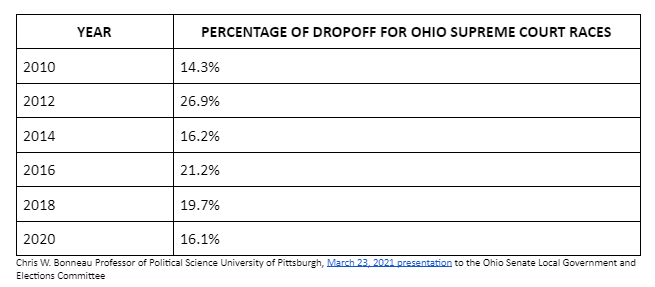Press Release
EDITORIAL ALERT: Senate Bill 80 is a cynical, dangerous push to politicize Ohio’s courts
Summary
- State lawmakers are fast-tracking a plan to inject partisan politics into the highest profile judicial races in the state — a push that is opposed by the current chief justice of the Ohio Supreme Court and the Ohio Judicial Conference.
- Senate Bill 80 recently passed the Senate (24-9) along partisan lines. It now heads to the Ohio House for consideration. Companion legislation HB 149 is also being considered in the House.
- Current law in Ohio allows judicial candidates to appear on a primary ballot with their partisan affiliation and seek the support of political parties, but it does not permit party ID to appear on the general election ballot for candidates for local judgeships, the state’s 12 appellate courts, or the state Supreme Court.
- A new Republican proposal would require candidates for Ohio’s appellate courts and the Supreme Court to have their partisan affiliation appear on the general election ballot. This proposal comes after Democratic candidates won three out of the last four races for the state’s highest court in 2018 and 2020, shifting the balance of the court from a 7-0 GOP majority to a 4-3 makeup.
- The proposal would not affect lower court races, where Republicans have been more successful — a tell that this legislation is not based on a good-government desire to inform voters, but pure partisan strategy.
- In addition, the percentage of Ohio voters who skipped making a choice in the 2020 state Supreme Court races was down significantly from previous presidential election years. This is another indication that the motivations behind this bill are based not on voter education, but political considerations.
Fast Facts
- Fact: Ohio Supreme Court Chief Justice Maureen O’Connor — a Republican — opposes putting partisan affiliation on the ballot for any judicial candidates. She has advocated for removing party ID from the ballot for primary elections, in addition to general elections.
- Fact: The Ohio Judicial Conference, which represents the interest of Ohio’s 723 judges at all levels of the court system, opposes this legislation. Ohio Judicial Conference Executive Director and former Supreme Court Justice Paul Pfeifer said in prepared testimony, “We believe that S.B. 80 would not only go against the very Canons of Judicial Conduct that exist for the purpose of ensuring a fair and impartial judiciary, but would also erode public confidence in our judicial system.”
- Fact: The current Ohio Supreme Court and its politically balanced makeup is encouraging reforms throughout the state’s judicial system, like moving toward ending cash bail, developing a centralized sentencing database and studying how to prevent wrongful convictions. Injecting more politics into campaigns for the state’s highest court could derail these much-needed reforms.
- Fact: Voter dropoff in the 2020 Ohio Supreme Court races — that is, the percentage of voters that skipped making a choice in the two races on the ballot last year — was at the lowest level since 2010. This indicates that most Ohio voters already have sufficient information to make informed decisions in these critical races.

In the News
Cleveland Plain Dealer: Ohio Chief Justice Maureen O’Connor again calls for eliminating party affiliation on judicial ballots
Toledo Blade: Depoliticize Ohio’s courts
Youngstown Vindicator: Some judge-race labels sought
Conclusion
Senate Bill 80 is a cynical, dangerous push to politicize Ohio’s courts and potentially derail much-needed judicial reform efforts. The organization representing the state’s judges and the chief justice of the Ohio Supreme Court oppose this effort, and with turnout in these races increasing over the past three presidential cycles, it is unnecessary. If the bill’s proponents truly believed partisan labels were needed to inform Ohio voters, they would not advocate for selective use only in certain races, leaving voters without the “needed” information in other judicial races. To the contrary, this legislation’s intent is partisan manipulation. There is no good-government rationale for it or for injecting more partisanship into the races for Ohio Supreme Court and the state’s 12 appellate courts.
